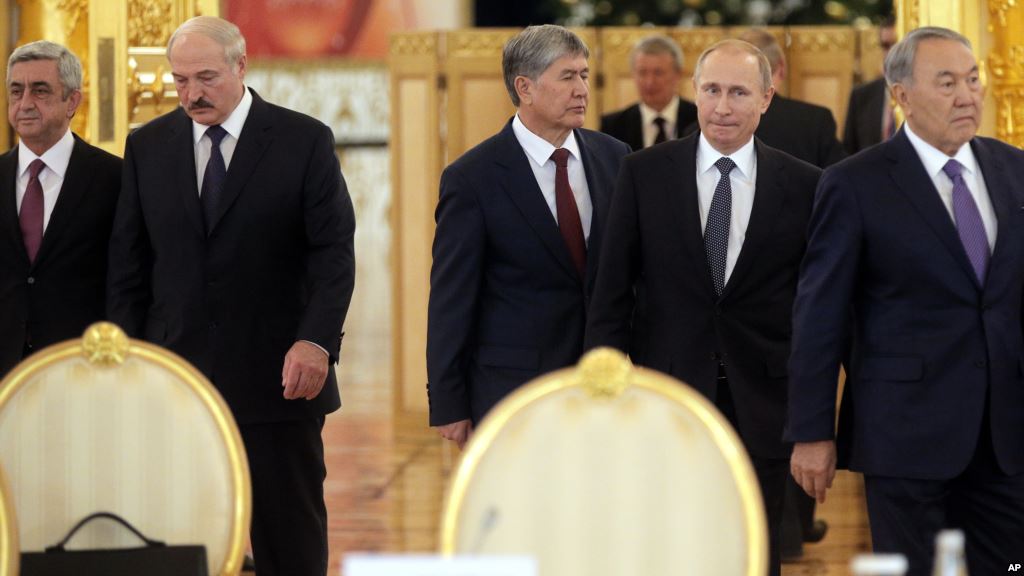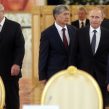
Kyrgyzstan Draws Closer to Eurasian Union Amid Crisis in Russia
Publication: Eurasia Daily Monitor Volume: 12 Issue: 5
By:

On January 1, 2015, Russia, Kazakhstan and Belarus, along with Armenia, co-launched the Eurasian Economic Union (EEU). The founding treaty of this economic bloc?whose genesis is widely attributed to Kazakhstani President Nursultan Nazarbayev, although it has become the key focus of Vladimir Putin’s foreign policy in recent years?was previously signed at the end of last May in Astana (Tengrinews.kz, January 2, 2015). The three post-Soviet states of Russia, Kazakhstan and Belarus, had already been tied together economically by a customs union since mid-2012.
A week before the entry into force of the EEU, another post-Soviet republic, Kyrgyzstan, made a final step toward future membership in the Russia-led union. On December 23, Kyrgyzstan’s accession treaty was formally endorsed by the presidents of the three founding countries during a meeting in Moscow, but it still needs to be ratified by their national parliaments to become effective. According to Kyrgyzstan’s President Almazbek Atambayev, his country’s official membership in the EEU is expected to take effect as of May 1, 2015, so that Bishkek “will celebrate the 70th anniversary of the victory in the Second World War in a new international status,” he proudly remarked (Kabar.kg, December 23, 2014; RIA Novosti, December 23, 2014).
Since Kyrgyzstan first made public its intention to join the Eurasian Customs Union of Russia, Kazakhstan and Belarus in late 2012, there have been many domestic debates about the eventual advantages and shortcomings of Bishkek’s integration plans. The Kyrgyzstani authorities continue to portray the Customs Union’s expanded successor, the EEU, as a promise of long-term economic stability for the national economy. But no other side broadly echoed this optimism except for Vladimir Putin during last month’s meetings in Moscow. “We are convinced that Armenia’s and Kyrgyzstan’s membership in the Eurasian Union is fully in line with their core national interests and will open up new horizons for their socioeconomic development,” the Russian president said. He further insisted on “mutual benefits” and “mutual respect” as the basis of multilateral cooperation (Kloop.kg, December 24, 2014).
On the surface, there are at least two areas in which Kyrgyzstan may reap real benefits from its participation in the EEU. First, Kyrgyzstani labor migrants, who work primarily in Russia—a small fraction work abroad in Kazakhstan—are expected to profit from much easier employment rules, as enforced by the union’s free movement of labor provisions. In January–October 2014, the volume of remittances from Russia to Kyrgyzstan increased by 1.6 percent year-on-year to $1.6 billion. In 2013, it stood at $2.2 billion, more than double the amount that Kyrgyzstan’s migrants sent home at the height of the financial crisis in 2009 (Vzglyad.kg, December 18, 2014).
Yet, due to the weakening ruble, there are growing fears that cross-border money flows may dwindle as early as this year, at a time when many Russian businesses have started to lay off personnel amid sluggish growth caused by the failing price of oil and Western sanctions (see EDM, January 5, 8). Last month, a high-ranking official of Kyrgyzstan’s Ministry of Economy told the local media that, in a best-case scenario, 2015 remittances could decrease by approximately $425 million as the ruble continues to be battered by the tumbling oil price. He also estimated that some 20 percent of Kyrgyzstani migrants might be forced this year to return home because of a shrinking labor market in Russia. With Russia’s chance to be the strong driver of the EEU?at least in 2015–2017?having now been undermined by its flagging economy, the planned liberalization of the labor market is unlikely to be of any considerable value to ordinary workers from the Kyrgyz Republic (For.kg, December 30, 2014).
Second, Kyrgyzstan, whose economy almost entirely depends on imported hydrocarbons, expects to strengthen its energy security within the framework of the EEU’s integrated energy market. In reality, this market will only be established by the middle of the next decade, even though oil, natural gas and their derivatives currently account for over 40 percent of intra-union trade. Still, it looks plausible that Bishkek’s accession to the EEU stands to be the price it has agreed to pay in exchange for ensuring stable gas supplies from Gazprom. Last April, the Russian energy giant took over state-owned KyrgyzGas for a symbolic price of $1. State-owned Gazprom has since pledged to invest more than $600 million into modernizing Kyrgyzstan’s energy infrastructure. And in December, it succeeded in resuming gas flow to the southern portions of Kyrgyzstan from neighboring Uzbekistan after months of fruitless talks (Pro-kg.com, January 1, 2015; Kabar.kg, April 10, 2014).
Since Kyrgyzstan will be granted yet-to-be-specified transition periods in order to make its legislation compatible with the Eurasian Union’s norms, it is difficult at this stage to assess the exact impact of the EEU on the country’s economic development. What is certain is that prices for most basic products will increase, as this earlier happened in Kazakhstan by way of market-driven price readjustments within the Eurasian Customs Union.
Moreover, tens of thousands of Kyrgyzstani nationals who make a living buying and selling goods from China may find themselves in a particularly precarious position: the cost of imports will go up, thus making them less competitive. While the Kyrgyz Republic’s official statistics put Kyrgyzstani-Chinese trade turnover at slightly above $1.5 billion in 2013, Chinese customs officials speak of upwards of $5 billion in traded goods. The discrepancy is explained by the fact that a large portion of cross-border trade still remains unknown to the authorities in Bishkek and, as a consequence, this sector likely employs a much bigger number of people than is generally estimated (Rus.azattyk.org, May 19, 2014; Kabar.kg, February 19, 2014).
Kyrgyzstan will hold its next parliamentary elections in late 2015, to be followed by local elections in 2016 and a presidential race in 2017. Hence, the success (or failure) of its EEU membership will be a litmus test of sorts for the Atambayev administration. At present, there are few indications that a financially weakened Russia can help Bishkek transition toward a stronger economic model. It looks more and more clear that in order to attain economic development, Kyrgyzstan will need to implement deep structural reforms or retain close economic ties to China—a country increasingly poised to become Central Asia’s, if not Eurasia’s, only superpower. And deeper integration in the Russia-led EEU will prevent Bishkek from pursuing either of these options.




